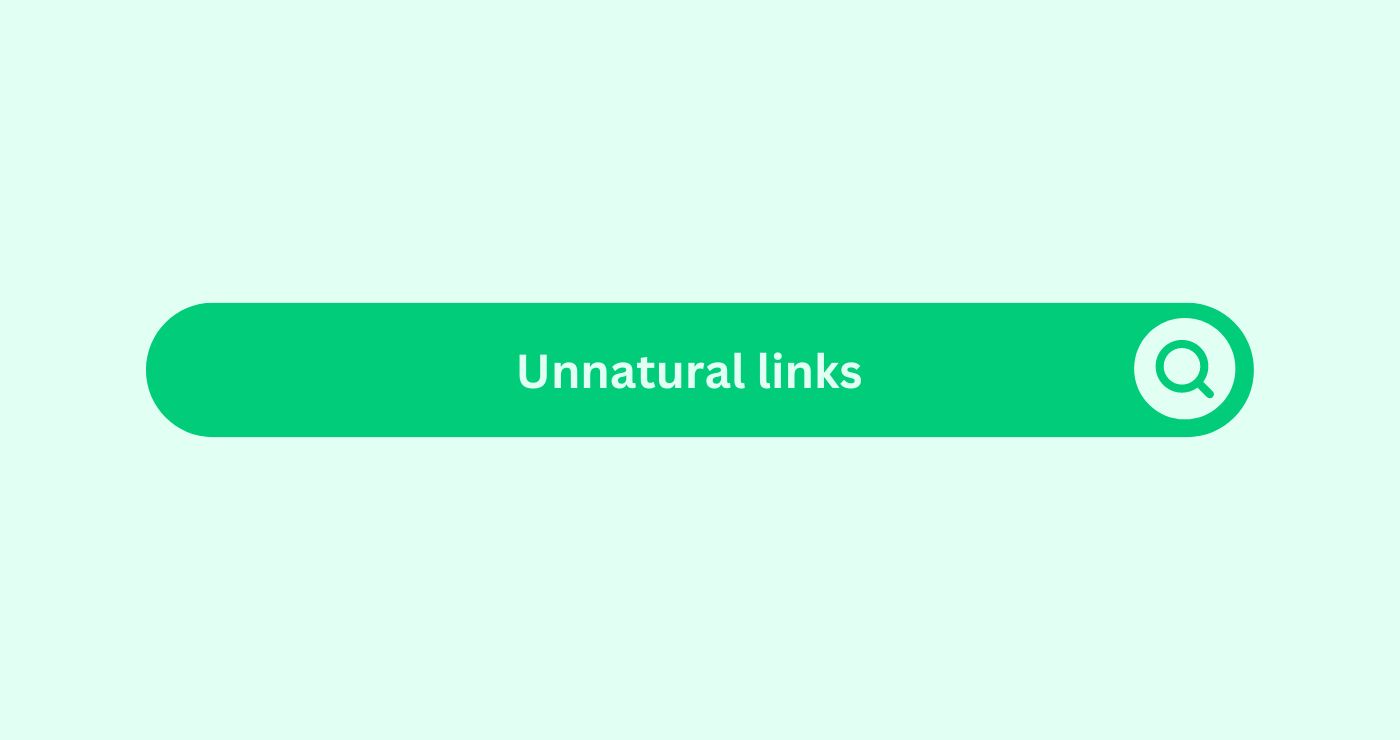Definition
Unnatural links in the SEO space are hyperlinks that individuals create with the primary intent of manipulating search engine rankings, rather than providing genuine value to users. These links violate search engine guidelines and can leadDefinition A Lead in the context of SEO refers to a potentia... to penalties that harm a website’s visibility and ranking in search results. Unnatural links often include link schemes, purchased linksDefinition Purchased links, also known as paid links, refer ..., excessive link exchanges, and links from spammy or irrelevant websites.
Unnatural links deceive by not reflecting a website’s organic popularity or authority, but by artificially manipulating search engine algorithms. Identifying and managing unnatural links is crucial for maintaining a website’s integrity and ensuring compliance with search engine guidelines.
How You Can Use
Example
Imagine you are managing the SEO for a blog that has experienced a sudden drop in trafficDefinition In the context of SEO (Search Engine Optimisation... and rankings. After conducting a thorough backlink audit, you discover several links pointing to your site from unrelated, low-quality, and spammy websites. Third parties placed these links or they resulted from a past, misguided SEO strategy, not your own efforts.
To address this issue, you first need to compile a list of these unnatural links. Using tools like Google Search ConsoleDefinition Google Search Console is a free web service from ..., Ahrefs, or Moz, you identify and document all suspicious links. Next, you reach out to the webmasters of these low-quality sites, requesting the removal of the unnatural links. For those that do not respond or comply, you use Google’s Disavow Tool to inform search engines that you do not want these links to be considered in your site’s ranking algorithmDefinition The SEO algorithm includes rules and calculations....
By removing or disavowing unnatural links, you help restore the integrity of your backlink profile, improving your chances of recovering from the drop in rankings and avoiding further penalties.
Unnatural Links Calculation
While there is no direct formula for calculating the exact impact of unnatural links, SEO tools and manual audits are commonly used to identify them. Here are some steps involved in the process:
- Backlink Audit: Use SEO tools like Ahrefs, Moz, or SEMrush to gather a comprehensive list of backlinksWhat are backlinks in the context of SEO? Backlinks, also kn....
- Link Evaluation: Analyze the backlinksWhat are backlinks in the context of SEO? Backlinks, also kn... based on criteria such as relevanceDefinition In SEO, relevance refers to the degree to which a..., quality of the linking site, and the context in which the link appears.
- Flagging Unnatural Links: Identify links that appear to be manipulative or violate search engine guidelines. Factors include links from unrelated or low-quality sites, links with overly optimized anchor textWhat is anchor text in the context of SEO? Anchor text refer..., and excessive reciprocal links.
By following these steps, you can identify unnatural links and take appropriate actions to mitigate their negative impact on your SEO performance.
Key Takeaways
- Unnatural links violate search engine guidelines and can result in penalties.
- Identifying and removing or disavowing unnatural links is essential for maintaining a healthy backlink profile.
- Regular backlink audits can help detect and address unnatural links promptly.
- Using SEO tools can streamline the process of identifying and managing unnatural links.
- Maintaining a clean backlink profile is crucial for long-term SEO success and avoiding search engine penalties.
FAQs
What are unnatural links in SEO?
Unnatural links are hyperlinks created to manipulate search engine rankings rather than provide genuine value to users, violating search engine guidelines.
Why are unnatural links harmful?
Unnatural links can leadDefinition A Lead in the context of SEO refers to a potentia... to search engine penalties, harming a website's visibility and ranking in search results.
How can I identify unnatural links?
Use SEO tools to audit your backlinksWhat are backlinks in the context of SEO? Backlinks, also kn... and look for links from unrelated, low-quality sites, or those with overly optimized anchor textWhat is anchor text in the context of SEO? Anchor text refer....
What should I do if I find unnatural links pointing to my site?
Request removal from the linking sites or use Google’s Disavow Tool to negate their impact.
Can unnatural links affect my site's ranking?
Yes, they can result in penalties that negatively impact your site’s rankings and overall SEO performance.
Are all purchased links considered unnatural?
Yes, buying links to manipulate rankings is against search engine guidelines and is considered unnatural.
How often should I audit my backlinks for unnatural links?
Regular audits, such as quarterly or biannually, are recommended to maintain a clean backlink profile.
What tools can help identify unnatural links?
Tools like Google Search ConsoleDefinition Google Search Console is a free web service from ..., Ahrefs, Moz, and SEMrush are useful for backlink audits and identifying unnatural links.
Can disavowing links recover my site’s ranking?
Disavowing unnatural links can help restore your site’s ranking over time, but it is not an instant fix.
Is it possible to completely avoid unnatural links?
While it is challenging to avoid all unnatural links, proactive management and regular audits can minimize their impact.




